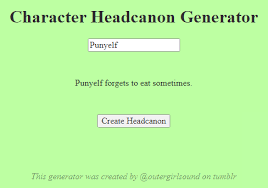Something character headcanons are a kind of fan convention that takes that up to eleven, where fans think about scenarios or qualities for characters that are not demonstrably true in the first works. These headcanons can be anything between an explanation for the simplest personality trait to the full back-letter of their character arc and they often results in some pretty percolated, sometimes cantankerous, discussions within our community. Opening up the debate to poll the most controversial character headcanons, this exploration highlights the way these creative interpretations challenge rivalries between fans and get people excited.
Legacy Characters - What They Are and Aren't
Legacy characters from long-running series like Harry Potter, or Star Wars is probably one of the most contentious aspects of character headcanons. For example, one much-debated headcanon is that Hermione Granger, from Harry Potter, is black. In 2015, J.K. Rowling tweeted, saying the colour of Hermione's skin had never been specified and she loved black Hermione. A fan poll from one of the largest fansites (in 2019) had about 12% of the vote.
Take, for example, the Star Wars universe, where some fans believe that Boba Fett - a bounty hunter who, as far as the original trilogy goes, is only ruthless - has a code of honor and guiding moral compass. This opinion is heavily debated amongst fan forums and threads typically get anywhere from 500-1000 comments on a poll when talked about on fan discussions.
Headcanons: Gender and Sexuality
Locations where headcanon can lead to very sore disagreements have another common denominator of gender and sexual orientation. One of the biggest headcanons through the Marvel Cinematic Universe is that of Loki's genderfluidity and bisexuality, which is rooted in Norse myth and something teased in comic. This was just a popular headcanon (2020 fan poll | 45# in favour), long before it was finally confirmed in the Loki series on Disney+.
Final Fantasy VII or Cloud Strife is occasionally headcanoned/HMded as troubled by his identity, torn to pieces by lousy memory manipulation, with a gloss of DID. It 's not surprising to me that this interpretation has amassed more than thirty threads dedicated to it in the main subreddit over the past year, showcasing an interesting way that fans implement headcanons to better understand these characters.

Fan Content Creation Adaptation
These headcanons can enhance the fan experience as well as serve as a jumping-off point for a myriad amount of fan-generated content such as fan fiction, art and even full-fledged web comics. These headcanons give people a second look at characters while also representing an inclusive way of writing that helps average viewers see anything related to their own identities and life experiences in their beloved characters.
For creators of that content, tools like the character headcanon creator can facilitate them in creating new aspects or stories for characters, leading to a more dynamic feedback loop where the main source material changes with the conversations of the fans. They have even become quite trendy tools (more than 20,000 use last month), which demonstrates that they are pushing the universe of the protagonists.
Navigating the Controversies
The source of most conflicts over headcanons seem to lie between older ideas of character and other ideals fans create for their chosen syllables. Even if these conversations can be divisive they also show just how much people care about and engage with different things part of the cultures they have ownership in. It enriches and diversifies the power of the original simply by extending it - the same way stories have lived on for centuries, by being shaped by those who listen to them and tell them, and the by making names and worlds their own.
After all, even if character headcanons are one of those hot-button issues that tear fan or online communities apart, they are equally positively part and parcel of what makes for stand-out, open, and so vibrant fan cultures. By that measure, which I personally think is one of the more intelligent ways to consider such things, all interpretations are equal and all interpretations are meaningless, opening fans up to near-limitless journeys that transform their media-watching experience, sometimes for the worse, but more often - as the sheer passion and creativity show in the responses to Knives Out - for the better.
